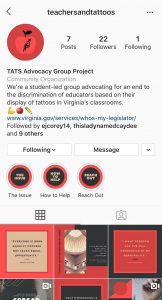Goal Fulfilled:
POSC 100, The American Political System, which I satisfactorily completed during the Fall 2019 semester, fulfilled my Civitae Pillar course requirement for Human Behavior and Social Institutions.
Reflection:
Taught by Dr. Eric Hodges, my POSC 100 class revolved around different issues of citizenship as well as the functions, agencies, and powers of the three branches of America’s federal government. Our main assignment was the “Demos Project,” a three-stage cumulative group project in which we identified and advocated for a local, state, or federal issue of our choice.
The first stage of the Demos Project was an independent project pitch, in which each student presented a possible group topic. I presented my pitch on the Equality Act and why we should support anti-defamatory and -discriminatory legislation on a federal level, a topic that is particularly meaningful to me. In my explanation of the bill’s merits, I told my class the following story:
A young man waited for hours in line after school to donate blood to the American Red Cross. Eventually, he was handed a clipboard and directed to fill out a waiver. Its first few prompts were basic: What is your full name? What is your phone number? What is your date of birth? As the young man continued to fill out the form, however, the questions became increasingly personal. Nonetheless, he answered them honestly, returned the paperwork to a volunteer, and was directed to a chair to await a nurse. Soon enough, the nurse arrived, paperwork in hand, and the young man was informed that he could not donate his blood. She apologized quietly before asking him to leave. The young man had no idea what to say. He was too shocked by the fact that a healthy young person like himself had been turned away because of an old, discriminatory policy from the eighties barring gay men from donating blood in the U.S.
That young man was me.
I will never forget the shocked faces of my classmates and professor in response to this revelation. The room fell silent once I finished, at which point I looked up and said something like, “I wish I could march right up to Mitch McConnell’s door and demand he introduce that bill in the Senate.”
I vividly remember Dr. Hodges looking me dead in the eyes and saying, “Why can’t you?”
While my pitch was not ultimately chosen as a group project topic, Dr. Hodges’s words stayed with me for the rest of the semester, and I will always remember them. If he and his class taught me anything, it is that we all have a stake in how America is governed, both locally and nationally, and it is imperative we make our voices heard. As my group progressed with the information gathering stage of the Demos Project, we developed a proposal to ban the discrimination of tattooed Americans in the workforce, focusing primarily on such discrimination in Virginia’s public schools. Heeding Dr. Hodges’s advice, I suggested we reach out to Senator Mark Peake of Virginia’s 22nd Senate district, which encompasses Farmville and all of Prince Edward County. Given his position on the Education and Health Senate Committee, we asked him to clarify the exact nature of Virginia’s discriminatory educational hiring procedures. Much to our surprise, he replied, explaining that the discrimination of tattooed workers is an unofficial policy, and the only means of preventing it would be a law passed by both houses of Virginia’s state legislature.
As part the final stage of our project, a PowerPoint presentation, our Teachers and Tattoos Advocacy Group (“TATS” for short) launched a social media campaign on Instagram, which I was tasked with designing. Below you will find a PDF of my original project pitch as well as a screenshot of our TATS Instagram page.
Though no bill preventing the discrimination of tattooed workers in the Commonwealth of Virginia has yet to be introduced in the Virginia House of Delegates or State Senate, I am proud of the work my group and I did to champion our cause. I will never forget the lessons I learned in POSC 100 or the words of Dr. Hodges that pushed me to take a stand on an issue I believe in. Though I know not what the future may hold, I do know I will never be afraid to champion equality and justice for all.
Artifacts:
